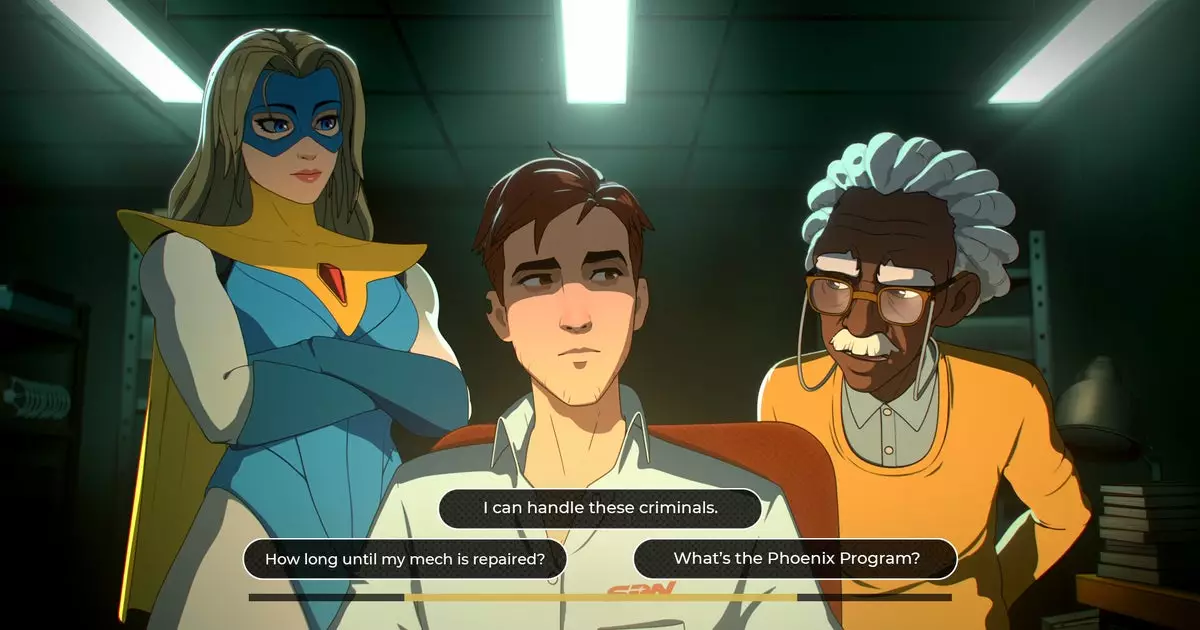In the ever-evolving world of video games, where new narratives vie for attention, “Dispatch” emerges as a refreshing breath of creative air. This visual novel transcends traditional gaming boundaries by artfully combining light strategic elements with a unique narrative spun around a team of reformed supervillains. Players are placed in the position of a dispatcher, guiding these quirky characters as they address urban emergencies, and the result is often as outrageous as it is entertaining.
Gone are the days where supervillains are merely one-dimensional antagonists. Here, they are fleshed out characters brimming with personality, each bringing a distinct flavor to the melee of escapades. The soundtrack of chaos resonates through assignments that range from the absurdly comedic—such as a French assassin tasked with fetching a balloon—to more complex scenarios where teamwork is essential, like thwarting a robbery led by the town’s criminal underbelly. Observing these characters navigate their pasts while attempting to contribute positively to society is not just entertaining; it’s a glimpse into how redemption can manifest in the most unexpected of ways.
The Power of Voice and Character
One of the game’s greatest assets is its voice acting talent. Featuring renowned actors such as Aaron Paul and Jeffrey Wright, “Dispatch” breathes life into each character, making every interaction feel authentic and engaging. The dynamic dialogue is enhanced by the natural chemistry between voice actors, resulting in conversations that encapsulate real camaraderie—albeit with a comedic twist. The exchange between characters flows seamlessly, almost like a lively podcast, enveloping players into their world while reflecting the consequences of past actions through humor and banter.
The carefully crafted interactions allow players to feel a connection with the characters, heightening the stakes of each decision. Notably, the game artfully avoids the pitfall of falling into cliché humor. Instead, the dialogue presents itself as a compelling commentary on social dynamics, albeit laced with absurdity. The team’s exploits often poke fun at traditional superhero tropes, but without crossing the line into insensitivity. This balance is crucial in an era where representation and sensitivity in gaming narratives are under scrutiny.
Dynamic Gameplay and User Choices
While the writing shines, the gameplay in “Dispatch” adds a layer of depth that makes each shift feel like an interplay of strategic and narrative-driven choices. Players engage with the roster of colorful characters, each possessing distinct abilities shaped by their villainous pasts, seamlessly integrating their quirks into the gameplay mechanics. The decisions you make have tangible consequences, leading to successful outcomes or comic disasters, like a bar fight spiraling out of control after an awkward drinking contest.
Despite its comedic undertones, “Dispatch” grapples with deeper themes. The intertwining of neurodivergence and disability within the character development may raise eyebrows, but it also serves as an invitation for thoughtful examinations of identity and acceptance. Managing this complex narrative while ensuring that the humor remains tasteful is no small feat; it is an ambitious attempt to navigate the line between light-hearted fun and meaningful representation.
Potential Pitfalls and Cultural Sensitivity
However, as with any narrative filled with diverse characters, the danger of misrepresentation lurks. The game occasionally teeters on the edge of crassness, particularly with certain racialized jokes that evoke unease for what they imply. Although the game’s intent appears rooted in humor rather than malice, the line between humorous commentary and offensive tropes can be precariously thin. The inherent challenge lies in ensuring that the punchlines buttress character development rather than overshadow it.
As players delve deeper, the risk of these potential missteps raises questions about the balance of humor and storytelling. Can comedic oversights undermine the entire experience, or are we to view them as part of a learning journey? The developers, stemming from a lineage of gaming brilliance at Telltale, seem poised to tackle these issues thoughtfully, but the outcome remains to be seen.
In a saturated market of superhero narratives, “Dispatch” carves its own identity through a beguiling mix of humor, depth, and strategy. It beckons players not just to enjoy the ride but also to ponder the often-packed suitcases of emotional baggage each character carries. A commendable venture into the light-hearted side of the hero-villain dichotomy, “Dispatch” offers a sophisticated portrayal of redemption within mischief—a delightful escapade that invites both laughter and introspection.

